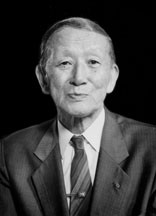October 17, 1898 - January 26, 1998
Shinichi Suzuki, the son of a violinmaker, went to Germany at the age of 18 to study violin under Karl Klingler. He found it difficult to learn the German language even though German children mastered it at an early age. He reasoned that if they can learn a complex language by absorbing it throughout their environment, then surely they must have the abilities to perform music by listening to good examples of beautiful music on a consistent basis at a young age. After returning to Japan, he formed the Suzuki Quartet with his three brothers. As well, he continued to research how young children learn their native language, a monumental task, and applied the "mother tongue" approach to music education resulting in the founding of the Talent Education Institute in Matsumoto, Japan in 1947. He also believed that this approach could be extended far beyond music education, as it was applicable to all learning.
For more information on Dr. Suzuki, the man, his philosophy, and his influence, explore the Suzuki Association of the Americas website.


